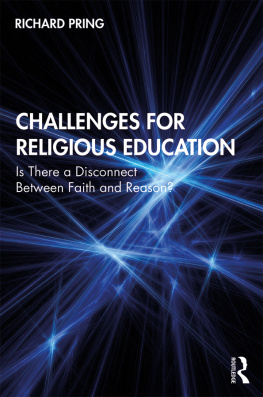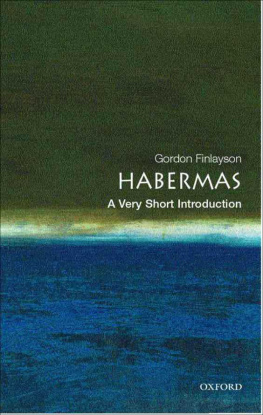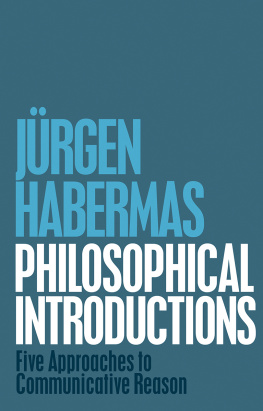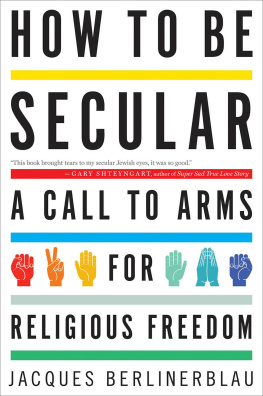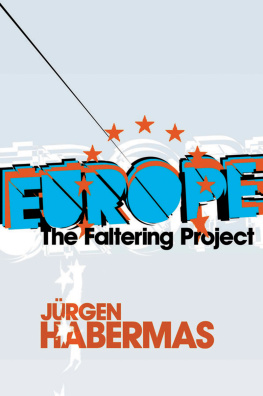Negotiating the Secular
and the Religious in the
German Empire
New German Historical Perspectives
Series Editor: Paul Betts (Executive Editor)
Established in 1987, this special St Antonys Series on New German Historical Perspectives showcases pioneering new work by leading German historians on a range of topics concerning the history of modern Germany and Europe. Publications address pressing problems of political, economic, social and intellectual history informed by contemporary debates about German and European identity, providing fresh conceptual, international and transnational interpretations of the recent past.
Volume 10
Negotiating the Secular and the Religious in the German Empire: Transnational Approaches
Edited by Rebekka Habermas
Volume 9
Humanitarianism and Media, 1900 to the Present
Edited by Johannes Paulmann
Volume 8
Space and Spatiality in Modern German-Jewish History
Edited by Simone Lssig and Miriam Rrup
Volume 7
Poverty and Welfare in Modern German History
Edited by Lutz Raphael
Volume 6
Anti-Liberal Europe: A Neglected Story of Europeanization
Edited by Dieter Gosewinkel
Volume 5
A Revolution of Perception? Consequences and Echoes of 1968
Edited by Ingrid Gilcher-Holtey
Volume 4
Popular Historiographies in the 19th and 20th Centuries: Cultural Meanings, Social Practices
Edited by Sylvia Paletschek
Volume 3
Work in a Modern Society: The German Historical Experience in Comparative Perspective
Edited by Jrgen Kocka
Volume 2
Crises in European Integration: Challenges and Responses
Edited by Ludger Khnhardt
Volume 1
Historical Concepts between Eastern and Western Europe
Edited by Manfred Hildermeier
Negotiating the Secular
and the Religious in the
German Empire
Transnational Approaches
Edited by Rebekka Habermas
First published in 2019 by
Berghahn Books
www.berghahnbooks.com
2019 Rebekka Habermas
All rights reserved. Except for the quotation of short passages
for the purposes of criticism and review, no part of this book
may be reproduced in any form or by any means, electronic or
mechanical, including photocopying, recording, or any information
storage and retrieval system now known or to be invented,
without written permission of the publisher.
Library of Congress Cataloging-in-Publication Data
Names: Habermas, Rebekka, 1959- editor.
Title: Negotiating the secular and the religious in the German Empire :
transnational approaches / edited by Rebekka Habermas.
Description: New York : Berghahn Books, 2019. | Series: New German historical
perspectives ; Volume 10 | Includes bibliographical references and index.
Identifiers: LCCN 2018056522 (print) | LCCN 2019002379 (ebook) | ISBN
9781789201529 (ebook) | ISBN 9781789201512 (hardback : alk. paper)
Subjects: LCSH: Germany--Religion--19th century. | Germany--Religion--20th
century. | Transnationalism. | Secularism--Germany--History--19th century.
| Secularism--Germany--History--20th century. | Germany--Social
conditions--1871-1918.
Classification: LCC BL980.G3 (ebook) | LCC BL980.G3 N44 2019 (print) | DDC
200.943/09034--dc23
LC record available at https://lccn.loc.gov/2018056522
British Library Cataloguing in Publication Data
A catalogue record for this book is available from the British Library
ISBN 978-1-78920-151-2 hardback
ISBN 978-1-78920-152-9 ebook
Contents
Rebekka Habermas
Wolfgang Knbl
Paul Michael Kurtz
Lucian Hlscher
Rebekka Habermas
Carolin Kosuch
Relinde Meiwes
Richard Hlzl and Karolin Wetjen
Introduction
Negotiating the Religious and the Secular in Modern German History
Rebekka Habermas
In August 2016, the New York Times published an article under the headline, From Burkinis to Bikinis: Regulating What Women Wear. The article is illustrated with two photographs. The first one shows a very formally dressed policeman on the beach of Rimini, on the Adriatic Coast of Italy, in 1957, writing a ticket for a woman wearing a bikini. Wearing a bikini (a swimsuit named after the Bikini Atoll Islands in the Pacific, which had become famous after the American nuclear bomb tests of 1946 in that region) was prohibited. At that time, the Italian government as well as most Italians argued in favour of the bikini ban on religious grounds. Following this line of argument, the bikini offended the Christian, in this case Catholic, religion. The second photograph shows three French policemen, dressed just as neatly as their Italian colleague decades before, forcing a woman sitting on the beach of a French town to remove her long-sleeved shirt. This photo was taken in August 2016, and the policemen are enforcing a ban on inappropriate clothing on beaches, colloquially referred to as the burkini ban, which had been issued some days earlier. Those who are supporting this ban argue that they are defending the secular, which is violated by religious, particularly Muslim, clothing habits.
There were neither bikinis nor burkinis in the German Empire, even though the most common bathing suits at that time were very similar to what is understood nowadays as a burkini nor had there been major conflicts about Muslim or Catholic clothing habits. However, the recent burkini debate and the steadily growing research field that deals with these and similar contemporary conflicts are perfectly suited as a starting point for an exploration of the religious landscape of nineteenth-century Germany. Until recently this landscape has been described with analytical notions such as secularization or the revitalization of religion. Since the 1990s, many historians have argued that those common explanations are misleading and that a new set of analytical tools and perspectives is needed to comprehend the significance of religion in the period. However, the question of which methodologies are most appropriate is still open to debate. I argue that contemporary debates concerning the place of the burkini in the public sphere can provide us with helpful points of departure for future research concerning nineteenth-century Germany.
What we can learn from these debates, as I want to show in this Introduction, is that we firstly should connect religious and secular studies. As illustrated with these recent examples from European beaches, and as scholars like Talal Asad have convincingly argued, our understanding of the secular is closely linked to our understanding of the religious, and vice versa. The religious and the secular are anything but stable categories, let alone unproblematic articulations of universal meaning. They are instead relational categories, mutually shaping and reshaping each other as much as different confessions shape each others identities.1 Following this perspective, debates on religious phenomena are also always discussions about the frontiers of the secular and thereby about the making and unmaking of the religious and the secular.2 However, connecting secular with religious studies is easier said than done this is, first of all, due to research deficits regarding secular studies within historical disciplines. While religious histories have been increasing in popularity for several decades, historians in contrast to sociologists and anthropologists have only very recently detected the secular, secularity or secularities as topics of historical research. Historians, therefore, rely on the help of disciplines such as anthropology and sociology, where secular studies have been in steady growth for some years, and where a whole range of ideas on how to think about the secular have emerged.


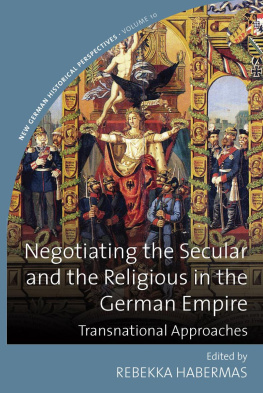

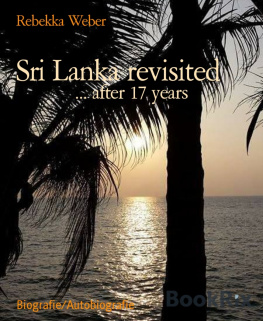
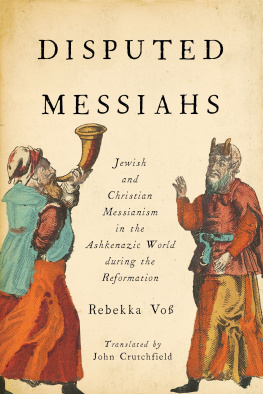
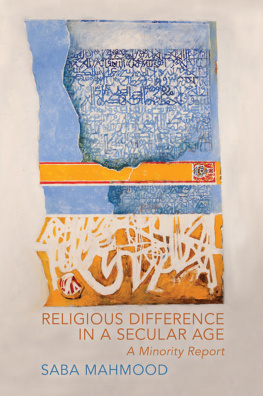

![Blackford - Freedom of religion [and] the secular state](/uploads/posts/book/167779/thumbs/blackford-freedom-of-religion-and-the-secular.jpg)
